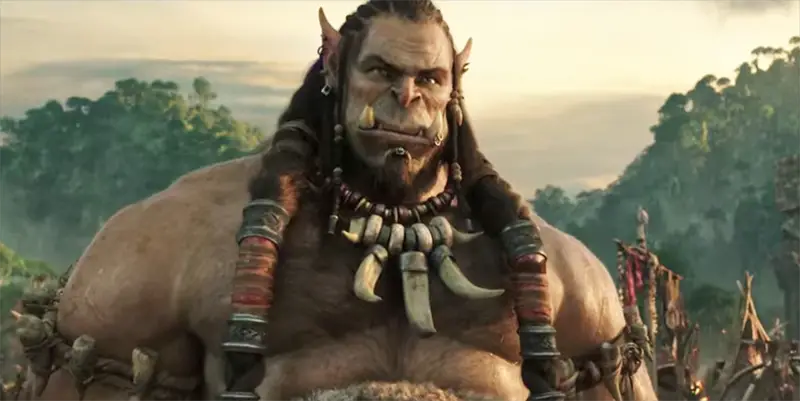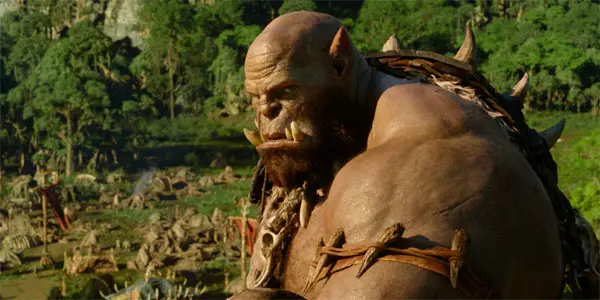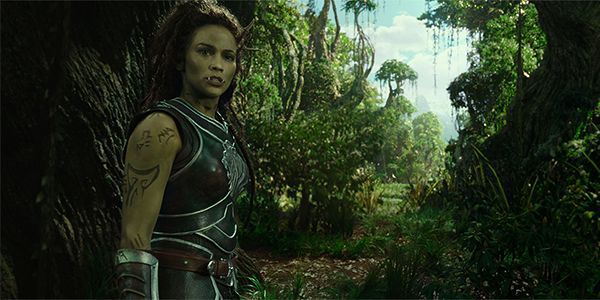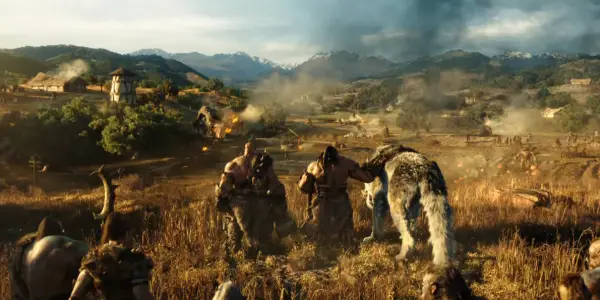WARCRAFT: So Close, Yet So Far Away From Greatness

The vast majority of video game films have failed for not respecting their source material, using them only as basic backdrops to put some hackneyed plot in place for a quick cash-grab. Various franchises like Tomb Raider and Prince of Persia have all failed because of this blatant apathy, and because those involved in their making didn’t care about how to integrate the art of making video games with the craft of making films. The less said about the absolute disasters that were the various video game films directed by talentless hack Uwe Boll, the better.
So it’s quite a shame to echo what other critics have said about this particular film, in that it fails for exactly the opposite reason that all video game adaptations before it have failed. Warcraft fails because those behind its creation love its source material too dearly, and condense too much of it into the film’s plot, turning it into a mountain of exposition about characters and worlds and lore that the majority of the world does not know about and therefore does not have any reason to care for. The kind of character development that introduced new audiences to the Lord of the Rings films (the first trilogy, anyway) is completely nonexistent here, with the makers assuming that the audience loves the franchise just as much as they do.
A Previously Great Director Loses His Way
The biggest shame of this is that for the first time, a genuinely good director was attached to the helm of a video game adaptation. Duncan Jones, the director of the excellent Moon and the very good Source Code, had already made two original properties that were among the best of their respective years, with the kind of nuance and maturity that is a rarity among films of the science fiction genre. When he was announced as the director of Warcraft, I was genuinely excited to see what he might try with it. After all, Peter Jackson was a controversial choice for Lord of the Rings, and for the first three installments was the perfect director for them.

To Jones‘ credit, only three major aspects of the film don’t work, while the rest works beautifully. The visual effects at play here are close to photorealistic, the orcs here being among the most fully realized CGI creations in recent times. But those three crucial flaws interfere with everything else that brings Warcraft so close to being something genuinely special, so much so that it genuinely pains me to give this film a negative review.
Those three flaws: writing, acting, editing. Everything else works, yet it ends up being a perfect example of how a director is only as good as his or her collaborators.
You Can’t Expect An Audience To Care About A Character
Jones co-wrote the screenplay with Charles Leavitt, whose last screen credit was the paint-by-numbers fantasy “epic” Seventh Son. Having seen that film, it would be hard to distinguish it from any other of the genre. So I’m not sure whether Leavitt or Jones deserves more blame for how profoundly uninterested I was in any of the characters or their so-called “development” in Warcraft. I’ll list a couple lines from the film that I’m quoting from the first trailer I found, and you decide how these lines don’t work:
“War is coming.”
“If we do not unite to fight this enemy, our world will perish.”
“Saving the world is not a one man job.”
“We fight together or we die together.”
I almost passed out from boredom typing that out. Imagine lines like those, with no emotion or inflection of any kind, and you can see how this film ends up being kind of a chore no matter how much they got right elsewhere. Really, every actor in this film, even the normally good ones, completely phone it in. They can’t exactly be blamed for this, since there isn’t a single moment where it seems like any of them were in the same room together, even when it’s obvious that they are.
The best possible comparison to this film is the Star Wars prequels, especially because those were also inflicted with wooden dialogue and no kind of real emotion for the majority of them. This isn’t exactly an insult, considering the kind of ambition and fan following both franchises have in common. But there’s never a moment in either where I believed the performances.
The Single Potentially Interesting Character Is Marginalized
It also has to be noted that there’s a character in this film, played by Paula Patton, who is a half-human, half-orc warrior, who exists purely to be ogled at by every other character in the film. She looks and acts almost exactly like Zoe Saldana’s character from Guardians of the Galaxy, and is named Garona to Saldana‘s Gamora. It’s such a profoundly half-assed character (though Patton herself does what she can with the part), that it ended up being cringey whenever she showed up.
At least Gamora had her own personal motivations and took an active part in conflict, whereas this character is left to the sidelines except when she’s required to play roll-call for a half-baked romantic subplot thrown in. She’s given something to do at the film’s climax, but it’s so sudden that it seems like a last minute revision to the script before the film even began shooting. It’s a shame, because a half-orc character sounds like the best way to be able to transition between kingdoms without any jarring changes in tone. Patton‘s character, portrayed by a good actress, is reduced to yet another sex object.

Note: Garona is a character that already exists in the video games, so she wasn’t created especially for this film. That being said, it’s blindingly obvious that she was only included so the audience would subconsciously compare her to the similar character from a far superior Marvel film, and thus look on the film more favorably than before. The whole thing smacks of studio interference – I still say that Garona should’ve been the lead character.
The Editing Just Doesn’t Work
The other major issue in Warcraft is the editing, since the pacing of the film is designed to jump around as much as possible, introducing characters and concepts who are seen briefly to explain the plot at me and then never appear again. Jones has said previously that much of the film needed to be cut in order to make it to theaters, but that doesn’t sound like a good enough explanation as to why every cut of this film is so intensely jarring to me. No character is given enough time to express any sort of reaction to anything, so we’re never allowed to see any attempt at emotion. Combine this with the wooden acting and the lack of characterization overall, and I just found myself wishing this film could’ve been what it was advertised to be.
Interestingly, the editor of this film was also one of the editors of the very first Star Wars film. His name is Paul Hirsch, look him up. It’s kind of shocking how awful of a job he did here since he’s partially responsible for one of the best-edited films of all time. Irony can hurt sometimes.

While I’m sure that people are going to give this film flak for its reliance on visual effects, I don’t think that’s fair considering how beautifully they’re integrated with the live-action portions of the film. This is a rare film that uses visuals correctly; it just fails in far more crucial ways.
The plot of Warcraft initially suggests a subversion of what we’ve come to expect from fantasy films, considering how it shows both sides of the conflicts in a way that Lord of the Rings never did. We see how both the orcs and the humans are sympathetic, and how each are manipulated by their leaders into fighting each other in a war that neither side can really afford.
There’s glimmers of potential within the mess; clear evidence that Jones and company had a vision, something more than mere franchise-building. The reasons for why we never got that film are probably lost to the times – we won’t know if it was Jones wearing too many hats, or the studio forcing changes that he couldn’t fight back against. I say this simply because it doesn’t have the stink I was expecting, the stink of a lazily made film that wants to suck out as much cash as possible before spawning an even more inferior sequel (Batman v Superman being the best example from this year).
Only Hardcore Fans Will Like This One
I know all of this can’t be easy to read if you’re a fan of the games, and in full disclosure, the only one of those I ever put any extensive time into was the virtual card game Hearthstone. That game is really fun, but obviously it doesn’t do much in explaining the lore of Azeroth and its denizens to you. My knowledge of the series beyond that is next to nothing, aside from the episode of South Park dedicated to the game. For a hardcore fan, I can only imagine how much it must hurt to be told that the film you’ve been dreaming of still doesn’t exist. Or perhaps you’ll see the film and enjoy the numerous references I don’t know about because of my lack of knowledge about the series.
Perhaps I would also like Warcraft more if I was already a fan (and I don’t dislike the series, I just never got into it). I’ve read about many fans getting upset that the film is getting such a critical tongue-lashing, and I’d certainly be just as upset if a video game property I really liked got a badly reviewed film (I’d lose my damn mind if they made a bad Metal Gear Solid movie).
I’d like to say now to anyone overwhelmed by my response that the intention is to inform you that this film had potential, and that it missed the mark. I wouldn’t look at that as a failure, since I know Jones still has quite a few good films in him. Reportedly he had an extremely difficult production, and it shows in the finished product. But in the end, is it better to have loved and lost or to have never loved at all? This film inadvertently suggests that the former is better. Too much reverence to the source material at the expense of everything else makes Warcraft a chore for anyone who isn’t already a fan of the series.
Did Warcraft bite off more than it could chew?
Warcraft is in theaters worldwide.
Does content like this matter to you?
Become a Member and support film journalism. Unlock access to all of Film Inquiry`s great articles. Join a community of like-minded readers who are passionate about cinema - get access to our private members Network, give back to independent filmmakers, and more.













